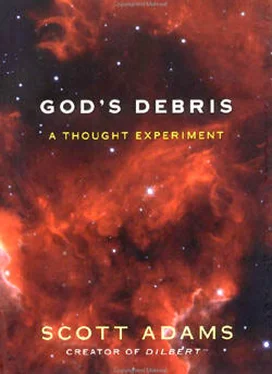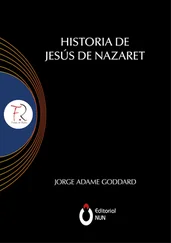Scott Adams
God’s Debris
A Thought Experiment
This is not a Dilbert book. It contains no humor. I call it a 132-page thought experiment wrapped in a fictional story. I’ll explain the thought experiment part later.
God’s Debris doesn’t fit into normal publishing cubbyholes. There is even disagreement about whether the material is fiction or nonfiction. I contend that it is fiction because the characters don’t exist. Some people contend that it is nonfiction because the opinions and philosophies of the characters might have lasting impact on the reader.
The story contains no violence, no sexual content, and no offensive language. But the ideas expressed by the characters are inappropriate for young minds. People under the age of fourteen should not read it.
The target audience for God’s Debris is people who enjoy having their brains spun around inside their skulls. After a certain age most people are uncomfortable with new ideas. That certain age varies by person, but if you’re over fifty-five (mentally) you probably won’t enjoy this thought experiment. If you’re eighty going on thirty-five, you might like it. If you’re twenty-three, your odds of liking it are very good.
The story’s central character has a view about God that you’ve probably never heard before. If you think you would be offended by a fictional character’s untraditional view of God, please don’t read this.
The opinions and philosophies expressed by the characters are not my own, except by coincidence in a few spots not worth mentioning. Please don’t write me with passionate explanations of why my views are wrong. You won’t discover my opinions by reading my fiction.
The central character in God’s Debris knows everything. Literally everything. This presented a challenge to me as a writer. When you consider all of the things that can be known, I don’t know much. My solution was to create smart-sounding answers using the skeptic’s creed:
The simplest explanation is usually right.
My experience tells me that in this complicated world the simplest explanation is usually dead wrong. But I’ve noticed that the simplest explanation usually sounds right and is far more convincing than any complicated explanation could hope to be. That’s good enough for my purposes here.
The simplest-explanation approach turned out to be more provocative than I expected. The simplest explanations for the Big Questions ended up connecting paths that don’t normally get connected. The description of reality in God’s Debris isn’t true, as far as I know, but it’s oddly compelling. Therein lies the thought experiment:
Try to figure out what’s wrong with the simplest explanations.
The central character states a number of scientific “facts.” Some of his weirdest statements are consistent with what scientists generally believe. Some of what he says is creative baloney designed to sound true. See if you can tell the difference.
You might love this thought experiment wrapped in a story. Or you might hate it. But you won’t easily get it out of your mind. For maximum enjoyment, share God’s Debris with a smart friend and then discuss it while enjoying a tasty beverage.
The rain made everything sound different—the engine of my delivery van, the traffic as it rolled by on a film of fallen clouds, the occasional dull honk. I didn’t have a great job, but it wasn’t bad, either. I knew the city so well that I could lose myself in thought and still do the work, still get paid, still have plenty of time for myself. When you’re inside your own head, the travel time between buildings evaporates. It’s as if I could vanish from one stop and reappear at the next.
My story begins on a day I delivered to a place I’d never been. That’s usually a fun challenge. There’s a certain satisfaction when you find a new place without using the map. Rookies use maps.
If you work in the city long enough, it begins to deal with you on a personal level. Streets reveal their moods. Sometimes the signal lights love you. Sometimes they fight you. When you’re hunting for a new building, you hope the city is on your side. You have to use a little bit of thinking— you might call it the process of elimination—and you need a little bit of instinct, but not too much of either. If you think too hard, you overshoot your target and end up at the Pier or the Tenderloin. If you relax and let the city help, the destination does all the work for you. It was one of those days.
It’s amazing how many times you can travel the same route without noticing a particular sign. Then when you’re looking for it, there it is. Universe Avenue. I would have sworn it wasn’t there a day ago, but I knew it didn’t work that way.
It was a scruffy package, barely up to company standards. I calculated the distance from my van to the doorway and decided the packing material could handle the moisture. On behalf of the package and myself, I surrendered to the rain.
This delivery required a signature. Those were the best kind. I could talk to people without any awkward lulls in the conversation. I liked people, but I didn’t feel comfortable chatting unless there was a reason. A delivery was a good excuse for some shallow interaction. People were happy to see me and I was never at a loss for words. I’d say, “Sign on this line,” and they’d say, “Thank you.” We’d exchange some meaningless wishes and I’d be off. That’s how it was supposed to work.
I walked up the four steps to the ornate wooden door and pressed the doorbell. A muffled bing-bong filled the interior and leaked out the cracks of the doorjamb.
Delivery people don’t like to leave the little yellow note, a confession of delivery failure. It means a do-over. I liked to do my work once. I liked my tasks to have beginnings and ends. As a rule of thumb, almost any customer can get to the front door in about a minute. But I usually waited two, in case someone was indisposed or having trouble walking. Two minutes is an eternity when you’re standing under a doorway on a rainy San Francisco afternoon.
Rookies wear jackets.
Two minutes passed. The company’s rules said I couldn’t try the doorknob. They were emphatic about that.
Ah, rules.
The oversized knob offered no resistance as it turned on its oiled core. I was no longer surprised to find unlocked doors in the city. Maybe at some subconscious level we don’t believe we need protection from our own species.
I figured I would leave the package inside the door and sign the customer’s name. I had signed for customers before; no one had complained yet. It was a firing offense, but that only happened if you got caught.
Inside I could see a long, dark hallway with red faux– textured walls lined with large, illuminated paintings. At the end was a half-opened door to a room that hosted a flickering light. Someone was home and should have heard the doorbell. I didn’t like the look of it. Occasionally you read about an elderly person who dies alone and no one knows about it for weeks. My mind went there. I stepped inside and closed the door, enjoying the warmth, deciding what to do next.
“Hello!” I said in my professional voice, hoping it sounded nonthreatening. I shuffled my way down the hall, noticing that the art looked original. Someone had money. Lots.
The source of the uneven light was a huge stone fireplace. I entered the room, not sure why I was being quiet. Somehow the room was both simple and overwhelming. It was half fire– washed color, half black, brilliantly appointed with antique wooden furniture, elaborate patterned walls, and wood floors. My pupils enlarged to tease out the shadows.
Читать дальше












